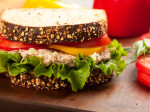 The Organic food market is gaining popularity in New Zealand.
The Organic food market is gaining popularity in New Zealand.
Last year organic foods contributed 1.1% of New Zealand’s domestic food and beverage consumption and the export market, in particular, is growing rapidly.1
Organic exports important to NZ
The development of the Organic food sector has helped local farmers to add value to their produce. Valued at NZ$70mill in 2002 NZ export sales of organic foods have grown to NZ$250mill in 2013. Export markets include Europe, USA, Australia, Japan, South Korea, Taiwan, China and South-east Asia.1
Last year around 10% of NZ apple production was organic. Fresh fruit and vegetables contribute NZ$100mill of these export sales. Zespri exported 4.3mill trays of organically grown green and gold kiwifruit and organic dairy production reached NZ$37 mill with Fonterra now milking 20,000 certified organic cows . 1
Although supermarkets sell some organic produce their range is limited however, many main cities around New Zealand now have organic food markets or co-operatives. Organic foods can also be purchased online. Warehouses that stock local and imported organic foods exhibit how varied this “market sector” has become.
Here you will find not only fresh fruit, vegetables, organically raised beef, pork, chicken, eggs, cheese, milk and yoghurt but also grains, cereals, baby foods, confectionery, ice-cream and ice blocks and baked goods. Many of these markets are also catering for customers wanting gluten, lactose and dairy free products and to support the “organic environment” you can also find household items such as soap, shampoos and laundry powders and even potting mix.
What does it take to be “organic”
The word “organic” is not protected by specific legislation although the Fair trading act does offer consumer protection from misleading behaviour of those selling organic foods.
“Organic” is often a term used to describe qualities that are natural, authentic and pure in everything from fabric, cosmetics, building materials, carpet, through to the way business is conducted, law is applied and even music is played.
When it comes to food, protecting its clean, natural image is important to New Zealand organic food producers.
Certification
Internationally NZ ‘s organic environment is seen to be ‘nuclear free’and ‘genetically modified free’. Also being geographically isolated has helped NZ farmers to avoid many pests and diseases that are common elsewhere.
To maintain an image of safety, quality and natural goodness for organic foods and beverages there are now several bodies assisting growers.
- IFOAM ,(International Federation of Organic Agricultural Movement) There are now 2 IFOAM accredited organic certifiers in NZ working with the Ministry of Agriculture and Forestry to validate compliance within strict international environmental standards.
- AsureQuality ; Bio-groNZ ; Demeter and OrganicfarmingNZ 2 are all organisations that provide the public with assurance that goods bearing their certification have been produced to required standards of quality. They also offer organic growers support and assistance to maintain standards and expand their markets.
A Management System
Organic food production seeks to:
- mirror natural eco-systems encouraging internal stability and renewal rather than reliance on external interventions.
- become established in areas of suitable farmland that has been free of chemicals for a number of years
- practice humane management of livestock and maintaining genetic diversity.
- maintain and improve the long-term quality, structure and fertility of the soil.
- avoid the use of synthetically compounded fertilisers, pesticides, growth regulators, livestock feed additives, antibiotic and hormone stimulants, chemical ripening, food irradiation and all genetically modified organisms, using instead cultural, biological and mechanical methods of food production.
- maintain and encourage agricultural and natural biodiversity on the property and surrounds through the use of sustainable production systems and the protection of plant and wildlife habitats.
- promote the sustainable use and protection of water resources and life therein.
- encourage the use of re-useable, biodegradable and recyclable packaging materials for its produce.
- grow foods in accordance with strict standards of certification which govern such things as the growing, storage, processing, packaging and shipping of produce.
- provide an audit trail keeping records of production and sales is reinforced by periodic on site farm inspections. 3
Shopping considerations
Cost
As with all foods, if you are able to shop around, it is possible to find cheaper organic foods if you are prepared to visit organic farms and farmers markets and if you are careful to buy foods in season.
Table 1 A comparison of cost for organic and non-organic fruit and vegetable
purchased from supermarkets and organic food growers markets
| Food | Weight | Non-organic | Organic at | Organic growers |
| Supermarket | Supermarket | Market | ||
| Apples | Kg | 3.95 | 5.99 | 2.99 |
| Pears | Kg | 4.55 | 6.99 | 3.49 |
| Kiwifruit | Kg | 2.99 | 8.27 | |
| Mandarins | Kg | 3.99 | 13.98 | 4.99 |
| Bananas | Kg | 2.99 | 3.97 | |
| Avocado/each | Each | 0.96 | 2.99 | 1.97 |
| Carrots | Kg | 1.52 | 6.9 | |
| Cauliflower | Each | 4.99 | 4.99 | |
| Leeks/each | Each | 1.99 | 2.99 | |
| Kale/150g | 150g | 2.39 | 3.49 | |
| Cos lettuce | 300g | 3.99 | 3.99 | |
| Silverbeet bunch | 250g | 1.56 | 1.99 | |
| Yams | Kg | 7.98 | 12.99 | |
| Kumara | Kg | 6.99 | 7.59 | |
| Flat Mushrooms | Kg | 14.99 | 14.49 | |
| Potato | Kg | 3.99 | 2.49 | |
| Red onion | Kg | 8.99 | 6.79 | |
| Beetroot | Kg | 6.98 | 3.99 |
Organic foods are more expensive because of the intensive farming practices they employ. From overseas experience it appears that as more farms convert to organic food production the costs do come down and the savings to the environment by reducing pollution and conserving water and soil quality may, in the long-term, be money well spent
Perception of Goodness
The public perception of organic foods, which is also promoted by the industry, is that organic food is safer, more nutritious and tastes better than conventionally grown food.
Certainly the perception of goodness has influenced the Chinese market for organic infant formula which since the 2008 Chinese Milk Scandal has seen the organic milk sales become the greatest in the world for 2014. 4
The perception of goodness is not without it’s hazards, as a study by Schuldt and Schwarz found out when they questioned 114 university student’s about their“thinking about food”.
When looking at the student’s perception of organic foods the researchers found that these foods were subject to a “halo effect” where students widely considered them to be lower in calorie and a “health food”. When students were asked to recommend a cookie and were told that the organic cookies contained the same number of calories as the non-organic variety, the students still recommended a greater consumption of the organic one’s, because they perceived the cookies as being “good for them”. The researchers warned that such thinking could lead to the over consumption of calories and an increased risk of obesity.5
Watch the weight
When buying organic foods it is important to watch the weight of goods. Often these foods (particularly green vegetables) are bundled up and sold at a price that seems comparative to non-organic varieties. On closer examination you may find that the bundle of the organic food weighs less than the non-organic alternative.
Are organic foods a healthier choice?
Studies seeking to compare the nutrient differences between organically grown and conventional methods of farming have proven difficult due to differences in testing methodology as well as variables in things such as climate, location, soil type and methods of animal husbandry.
Antioxidants
A 2014 meta-analysis of 343 studies found that organically grown crops had higher concentrations of antioxidants, containing 17% more antioxidants overall compared to conventionally grown crops. Concentrations of phenolic acids, flavanones, stilbenes, flavones, flavonols, and anthocyanins were particularly elevated, with flavanones being 69% higher.
Many of these compounds have previously been linked to a reduced risk of cardiovascular and neurodegenerative diseases. 6
Vitamins
A 2012 survey of the scientific literature, failed to find any significant differences in the vitamin content of organic and conventional plant or animal products 7,8
Pesticide residues
Conventional growers spray their crops with synthetic pesticides to protect crops from mould, insects and disease. Some of these residues can remain on the produce. Organic farmers use insect traps, disease resistant varieties, predator insects or beneficial micro organisms to control crop damaging pests.
A 2014 meta-analysis found that conventionally grown produce was four times more likely to have pesticide residue than organically grown crops.6
However residues on most foods organic or non organic don’t exceed the government safety threshold.
In NZ the Ministry of Primary Industries (MPI) surveys foods under the Food Residues Surveillance Programme (FRSP). This service monitors pesticide residue and chemical contaminants in NZ produced and imported foods to ensure their safety.This data is publicly available. 9
Cancer risk
The American and The NZ Cancer Societies have both stated that no evidence exists that the small amount of pesticide residue found on foods will increase the risk of cancer, though they recommend thoroughly washing fruits and vegetables. They have also stated that there is no research to show that organic food reduces cancer risk compared to foods grown with conventional farming methods 10
Allergies
Studies in the Netherlands have reported the consumption of organic dairy products was associated with lower eczema risk, but there was no association of organic meat, fruit, vegetable or egg or the proportion of organic produce within the total diet with the development of eczema, wheeze or atopic sensitisation. Further studies are warranted.11
Food safety tips
Whether or not you choose to eat organic or non-organic foods it is the total food quality, and whether or not you are meeting your daily total nutritional requirements, that matters most.
Here are some tips to help your food selection:
- Choose food from a range of food sources to add variety and limit exposure to a single pesticide.
- Buy fruits and vegetables in season and as fresh as possible. (Buy frozen foods where there is a high turnover of goods)
- Read labels carefully for use by date and also note the weight. Just because food claims to be natural or organic doesn’t mean it is a healthier alternative. Some organic foods can be higher in fat, salt, sugar and energy than conventionally grown foods..
- Wash and scrub food to remove dirt, bacteria and traces of chemicals 12
- To reduce food costs try growing your own organic fruit and vegetables and where ever possible club together with friends to share and vary the type of foods grown.
If you would like help to improve the nutritional quality of your diet then contact us today.
References
1 http://organictradenz.com/whynz
2 IFOAMhttp://www.ifoam.org/; Assurequality http://www.asurequality.com/; Biogro http://www.biogro.co.nz/;Demeter http://www.biodynamic.org.nz/, Organicfarm http://www.organicfarm.org.nz/
3 http://www.biogro.co.nz/faqs-about-organics
4 Chen, Jue (February 2014). “Food safety in China opens doors for Australia’s agri sector”. Australia China Connections. Retrieved 27 March 2014.
5 Schuldt, J.P. and Schwarz, N. (2010). The “organic” path to obesity? Organic claims influence calorie judgments and exercise recommendations” Judgment and Decision Making 5: 144–150.
6 Barański, M; Srednicka-Tober, D; Volakakis, N; Seal, C; Sanderson, R; Stewart, GB; Benbrook, C; Biavati, B; Markellou, E; Giotis, C; Gromadzka-Ostrowska, J; Rembiałkowska, E; Skwarło-Sońta, K; Tahvonen, R; Janovská, D; Niggli, U; Nicot, P; Leifert, C (Jun 26, 2014). “Higher antioxidant and lower cadmium concentrations and lower incidence of pesticide residues in organically grown crops: a systematic literature review and meta-analyses.”. The British journal of nutrition: 1–18. PMID
7 Smith-Spangler, C; Brandeau, ML; Hunter, GE; Bavinger, JC; Pearson, M; Eschbach, PJ; Sundaram, V; Liu, H; Schirmer, P; Stave, C; Olkin, I; Bravata, DM (September 4, 2012). “Are organic foods safer or healthier than conventional alternatives?: a systematic review.”. Annals of Internal Medicine 157 (5): 348–366. doi:10.7326/0003-4819-157-5-201209040-00007. PMID 22944875.
8 Dangour AD, LockK, Hayter A, Aikenhead A, Allen E, Uauy R. Nutrition related health effects of organic foods: a systematic review. Am J Clin Nutr 2010 http://ajcn.nutrition.org/content/92/1/203.long
9 http://www.foodsafety.govt.nz/policy-law/food-monitoring-programmes/food-act-1981/frsp/
10 “Common questions about diet and cancer”. Cancer.org. Retrieved 2014-06-17. http://www.cancernz.org.nz/assets/files/IS_ChemicalsandCancer080509.pdf
11 Kummeling I, Thijs C, Huber M, Vande Vijver LPL Snigders BEP et al. Consumption of organic foods and risk of atopic disease during the first 2 years of life ni the Netherlands. Br J Nut. 2008http://www.ncbi.nlm.nih.gov/pubmed/17761012

































































Leave a Reply